#and the multigenerational friendships and community
Text
something about the connection between dream and techno's dad... how they're both so awkward but so determined to do this... techno's dad telling dad jokes and giving dream the same advice he gave techno, and dream showing him what his dad said to him... him promising to send dream the reddit posts that he wants to share with techno... both of them remembering events and laughing about them and filling each other in on their own side of the story... this just means so much to me and I'm not quite sure how to express it
#it's about the connections we can make and the love we can have for people we might never have met#and the multigenerational friendships and community#how techno's dad clearly respects dream so much but he still has to tell dad jokes and pretend he doesn't understand his career choices#dreamwastaken#technoblade#crying over the beauty of human connection in the club tonight
56 notes
·
View notes
Text
cross-generational friendships have been so important and formative and crucial to my adulthood. and i'm not talking about "oh I'm in my 20s and nearly all my friends are in their 30s ha ha ha" [true], I'm talking about "I labored side-by-side with people in their 40s, 50s, and 60s and became friends with them."
one such friend and I went to a funeral today to support a third friend and it really reaffirmed how important these relationships have been to me and how good they are for keeping perspective and taking advice from people with more experience than you.
tomorrow I'm going on a walk and then getting lunch with an old boss-turned-friend/mentor who's old enough to be my mother (like, literally her oldest son is my age) and I'm looking forward to it so much. having friends who you can bond with but also learn life lessons from is such a gift and it makes me lament my current work situation (everyone on my team is within a 3-year age range).
#which is good for memes and general internet savviness but like. there's so much to be learned from more ppl y'know#i'm glad we got to support our friend today#and I'm soooo looking forward to tomorrow. I miss this woman so much. she really sees herself in me (we have similar ''backstories'')#and I think a lot about how she told me that hiring me (and a few other Young Guns) made her change her mind about millennials/gen z [lolll#but like that's exactly it right? that you can make connections with people you may NOT think you have community with#and BAM suddenly you're not just in community but you're also friends. you can take and give in turn and just really gain better insight#sorry I'm passionate about multigenerational friendships. the 68yo south sider I worked with taught me so much lol I love her
34 notes
·
View notes
Note
Do u have any book and movie recommendations?
sooooo many. you might regret asking.
I love books very very much, just in case you didn't know, so let me fire off at random some of my all time faves with and without blurbs.
poetry: Devotions, Mary Oliver | No Matter the Wreckage, Sarah Kay | Leaves of Grass, Whitman | Post Colonial Love Poem, Natalie Diaz
nonfiction:
My Life in France, Julia Child --- her memoir of moving to France with her husband post WWII and her discovery of cooking and deciding to write her cookbook and it's so charming and so her and it's just a delight
Open Me Carefully, Emily Dickinson --- a chronological collection of letters, poems, and letter-poems Emily sent to her lover sister-in-law Susan Dickinson. it's intimate, playful, kind, passionate, and the editors do a great job of putting it all together. and you read it and just know that you are only skimming the surface of the deep love these two women had for each other i gotta lie down
What I Was Doing While You Were Breeding, Kristin Newman --- funny sexy travel memoir by a TV writer who spent her hiatus months in the aughts summers by traveling solo and having whirlwind romances and also her reconciliation between being the woman who can't be tied down but also wanting to build a life with a partner.
The Real Traviata, Rene Weis --- an opera book because me. a biography about Marie Duplessis, the French woman who inspired Dumas to write La Dame aux Camellias and therefore Verdi's Traviata and THEREFORE Baz Luhrman's Moulin Rouge. she had by the most objective accounts a difficult and short life full of fear and illness and abuse but also full of strength and color and love and I found it really moving.
fiction: aka the novels I am thinking most about right now.
House of the Spirits, Isabel Allende --- an all time favorite. a historical, multigenerational epic that left me staring at the ceiling after finishing it. and cemented Allende's place as one of my fave authors
The Sentence, Louise Erdrich --- it's about ghosts and independent bookstores and indigenous women and community and love and trust and the pandemic. great novel.
Sex and Vanity, Kevin Kwan --- people are always looking for who they should crown the modern Jane Austen, and it's him. it's kevin kwan. this is a modern remix of A Room with a View and it is funny and sexy and sweet and was a delight to read.
Beautiful World, Where Are You, Sally Rooney --- my favorite of hers. I love how the chapters of story are interspersed with emails between the two leads. yes there's romance, but the real center of this story is the friendship between the two women.
On Earth We're Briefly Gorgeous, Ocean Vuong --- entirely lives up to the tumblr hype. possibly exceeds the tumblr hype. I told my best friend to read this book. which she did. then scolded me because while she agrees it's beautiful it's also so heartbreaking. truly some of the most beautiful prose I've ever read. I checked it out from the library but i really want a copy of my own to mark up.
Bright Young Women, Jessica Knoll (out Oct. 3rd) --- i got this ARC at the librarian convention. I'm in the middle of it right now but I have to talk it up because it is sooooo good. It's about women who meet because they have the worst possible thing in common: their best friend was murdered by the same serial killer. It hops around between the '70s and the present day, reads like a thriller, and the thesis is really about destroying the myth of the criminal mastermind, a la all those true crime docs about dahmer and bundy. I'm almost halfway through and the murderer is only referred to as "The Defendant." It's about taking the narrative away from him, the universal defendant, and recentering it around the exceptional women whose lives he ended and/or destroyed. Again, please check it out when it comes out this fall. But be forewarned that the subject matter is dark.
as for MOVIES, well, if I tried to make a list like the one above I'd be here all day, so why don't I just list a handful that I consider central to understanding who I am as a person:
Monty Python and the Holy Grail
The Life of Brian
The Blues Brothers
The Princess Diaries 1 AND 2
Little Women (2019)
Juno
The Holiday
Pride and Prejudice (2005)
Star Wars, the OG and prequel trilogies
and, last winter I stumbled across The Four Seasons starring Alan Alda and Carol Burnett, and I thought it was delightful.
#asks#anon#recs#i'm almost done with BYW now and it's. god. it's so good. I've annotated my copy to bits#the themes of appearances over substance#and the systemic valuing of men's comfort over women's safety#it just HITS#also half the main cast is gay and you know I love that#if you like gillian flynn and feel weird about the true crime fandom phenomena then you will like this book#i shared a post by the author on insta and she responded which is super cool
4 notes
·
View notes
Text

Pickleball: A Sport for All Ages
Introduction:
In the realm of sports, Pickleball has achieved something remarkable—it has transcended age boundaries and become a sport for all generations. This article delves into the fascinating world of Pickleball, highlighting its popularity among seniors, its integration into schools and youth programs, and its appeal to adults of all ages. We'll explore the multigenerational charm of Pickleball and its role in promoting active aging.
Seniors Embrace Pickleball:
Pickleball has captured the hearts of senior citizens across the globe. What draws them to this sport? It's a combination of factors. Firstly, Pickleball is gentle on the joints, making it accessible to those with varying levels of physical fitness. This low-impact nature is a boon for seniors looking to stay active.
Moreover, Pickleball is inherently social. The sport is often played in doubles, fostering camaraderie and friendship on the court. It's not just about the competition; it's about the connections forged through the love of the game.
One need only visit a local Pickleball court to witness the joy that seniors derive from the sport. Their agility and enthusiasm are a testament to Pickleball's ability to keep older adults physically fit and mentally engaged.
Pickleball in Schools and Youth Programs:
Pickleball's journey extends from the senior community to schools and youth programs. Recognizing the sport's adaptability and educational value, many schools have introduced Pickleball into their curriculum. This move has opened doors for young players to discover the joys of Pickleball.
Why is Pickleball a perfect fit for schools and youth programs? Firstly, it's easy to learn. The rules are straightforward, and it doesn't require an extensive skill set to get started. This accessibility ensures that children of all athletic backgrounds can participate.
Additionally, Pickleball teaches valuable life skills such as teamwork, strategic thinking, and sportsmanship. It's not just about hitting the ball; it's about developing a well-rounded individual.
Adults Finding Fitness and Fun:
It's not just the young and the old who are drawn to Pickleball. Adults of all ages are discovering the joy of this sport. Whether you're in your 30s or your 60s, Pickleball offers a unique blend of fitness and fun.
Adult Pickleball leagues and clubs are on the rise. These communities provide a space for like-minded individuals to come together and enjoy the sport. The result? A healthier, happier, and more connected adult population.
Pickleball is more than just a workout; it's an experience. The thrill of the game, the sound of the ball hitting the paddle, and the joy of victory make it an addictive pastime.
The Multigenerational Appeal:
What sets Pickleball apart is its multigenerational appeal. It's a sport where grandparents can play with their grandchildren, and everyone in between can join in. This inclusivity is a testament to the sport's versatility.
Families are discovering that Pickleball is the perfect bonding activity. Whether it's a weekend game at a local court or a holiday tournament, Pickleball brings generations together. It's a rare sport where grandparents can showcase their skills to younger family members, leveling the playing field and creating cherished memories.
Pickleball for Kids and Families:
For parents looking to introduce their kids to sports, Pickleball is a fantastic choice. The adaptability of Pickleball equipment and court sizes makes it accessible to children. It's a sport that kids can pick up quickly, leading to hours of outdoor fun.
The family that plays Pickleball together stays active together. Parents can impart valuable lessons about teamwork, discipline, and fair play through this engaging sport. It's a win-win situation where everyone gets exercise and quality time together.
The Role of Pickleball in Active Aging:
As we age, staying active becomes increasingly important. Pickleball aligns perfectly with the concept of active aging. It's a sport that not only keeps seniors physically fit but also mentally sharp.
Research has shown that regular physical activity can help delay the onset of age-related issues. Pickleball, with its blend of cardio and strength training, is a fun way to achieve this. It's not just about prolonging life; it's about enhancing its quality.
Conclusion:
In conclusion, Pickleball is a sport that defies age barriers. From seniors who relish the social aspects to kids discovering their love for sports, Pickleball offers something for everyone. It's a sport that promotes active aging, fosters family bonds, and brings communities together. As the Pickleball community continues to grow, it's evident that this sport is here to stay—a sport that truly transcends generations.
Discover how Pickleball is captivating the hearts of individuals of all ages, from seniors savoring active retirement to kids enjoying an exciting introduction to sports. Explore the full article on our website blog and join the Pickleball revolution! https://novasportsgear.com/pickleball-a-sport-for-all-ages/
0 notes
Text
The phenomenon of "Disney adults" represents a cultural trend where individuals, typically older than the traditional target audience, maintain a deep and enduring passion for Disney. This phenomenon has sparked discussions about nostalgia, fandom, and the influence of media on identity.
**1. Nostalgia and Childhood Connection:**
Disney adults often cite a strong sense of nostalgia as a driving force behind their continued connection with Disney. The brand's iconic characters, theme parks, and movies play a significant role in shaping childhood memories, and for Disney adults, maintaining this connection becomes a way to preserve a sense of innocence and joy from their formative years.
**2. Escapism and Fantasy:**
Engaging with Disney content offers a form of escapism for adults facing the challenges of the real world. The enchanted worlds, whimsical characters, and timeless narratives provide a retreat from adult responsibilities, allowing Disney adults to temporarily immerse themselves in a world of magic and fantasy.
**3. Fandom as Identity:**
For many Disney adults, being part of the Disney fandom becomes a core aspect of their identity. This is evident in the way they incorporate Disney themes into various aspects of their lives, from home decor to fashion choices. This sense of belonging to a community that shares similar interests reinforces the significance of Disney in shaping personal identity.
**4. Connection Beyond Entertainment:**
Disney adults often find a sense of community with others who share their passion. This goes beyond mere entertainment; it becomes a bonding experience that fosters friendships and social connections. Disney-themed events, conventions, and online forums provide platforms for like-minded individuals to come together.
**5. Criticisms and Stereotypes:**
Despite the positive aspects, Disney adults may face criticism and stereotypes. Some argue that an excessive attachment to Disney represents an unwillingness to fully embrace adulthood. However, many Disney adults assert that their love for Disney does not hinder their ability to navigate the complexities of adult life.
**6. Disney's Marketing and Cultural Influence:**
Disney's strategic marketing plays a crucial role in perpetuating the connection with older audiences. The company continuously releases new content and merchandise that appeals to both nostalgia and contemporary interests, ensuring a sustained engagement with its audience across generations.
**7. Multigenerational Appeal:**
Disney's storytelling often contains universal themes that resonate with individuals of all ages. The multigenerational appeal contributes to the longevity of Disney's influence, as parents share the magic with their children, creating a continuous cycle of fandom.
In conclusion, the phenomenon of Disney adults reflects a complex interplay of nostalgia, escapism, and identity formation. As individuals navigate the challenges of adulthood, the enduring magic of Disney provides a source of comfort, community, and a timeless connection to the enchantment of childhood.
#disney#disney adults#childhood#disneyland#disney world#theme park#marketing#cultural influence#nostalgia#nostalgic#chatgpt
0 notes
Text
Over the Shop
Written by JoArno Lawson, illustrated by Qin Leng
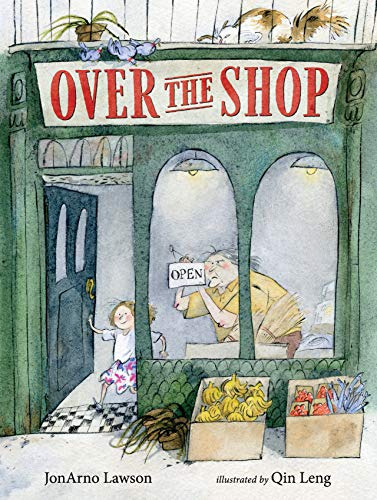
Print Book
Published January 5, 2021 by Candlewick Press
Honors: School Library Journal Best Book of the Year (2021), Kirkus Reviews Best Children’s Books (2021)
Dimensions: 8.5 x 11.5, 40 pages
Age range according to publisher: 3-7. I would say 4-7. Parts are illustrated in low contrast colors and thin lines that might not appeal to 3-year olds.
Over the Shop is the wordless story of a grandparent and granddaughter who own a shop and are trying to rent out the ramshackle apartment on the second floor.
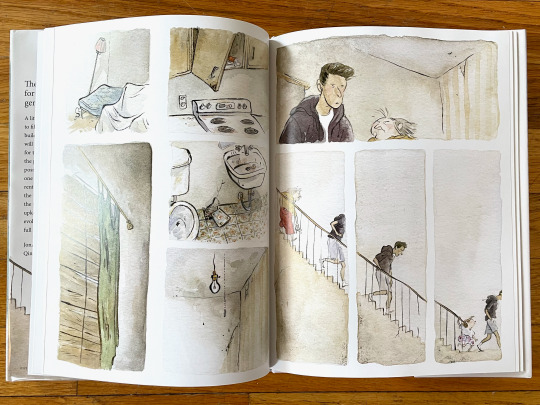
Many potential tenants are scared away by the unit’s poor condition until a young interracial/LGBT+ couple wants to move in.

Despite the grandparent’s initial resistance to them, the couple are wonderful neighbors who transform the apartment into a cozy home and offer friendship, support, and inspiration to the community. The closing pages show the formerly run-down building as a refreshed and welcoming place of gathering and love, with a Pride flag adorning the front stoop.

The art of Over the Shop tells the story without any reliance on text and invites readers to absorb the story through clues on the page. In the first half, the colors are muted, emphasizing the run-down atmosphere. The grandparent’s hunched body language, frustrated expressions, and disheveled appearance contrast with the little girl’s upbeat demeanor, kindness to others, and floral clothing. The young couple’s arrival also contrasts them with the unkempt environment they will soon help to change: they are well dressed and groomed, loving towards each other, and gracious towards the grandparent despite being initially rejected.
Throughout the pages that show the couple moving in, cleaning/decorating the apartment, and even repainting the shop facade, the art begins to include more light and color. The couple’s positive influence is shown through the end of the book as the shop and street become cleaner, brighter, and community-oriented.
Children may especially enjoy the comic subplot of a stray cat (initially shown stalking pigeons on the inside cover) that is fed by the little girl and eventually adopted by the young couple. The cat is in the background of several pages and children may have fun locating it. The inside back cover shows the pigeons at rest, finally at peace with the cat adopted.
This would be a good recommendation for someone seeking books on non-traditional family units, LGBT+ and interracial relationship representation, and community support.
While reading Over the Shop, opportunities for several discussions may arise.
This book could be used to initiate early conversations about social justice in the areas of race, gender, and housing discrimination. How can we support those who are treated badly by unjust people/systems? How can we create space for everyone to share their unique gifts with the community?
Children can compare the before and after of the building and count up the visual differences: the mossy roof, dead plants, boarded up windows, faded paint, etc. at the beginning with the fresh paint, flowers, new activity, etc at the end. Caregivers can share how it’s important to care for our homes, neighborhoods, and towns, and how little things like properly disposing of trash, keeping our rooms clean, and more can create a cozy and happy environment.
Overall, Over the Shop is a heartwarming story of building an inclusive, multigenerational community that can be enjoyed by young readers at different stages of literacy.
0 notes
Text
The problem with the nuclear family model
An unnecessary division of community. It's a direct product "American dream" propaganda, and the individualistic "pick yourself up by your bootstraps" ideals.
And it is Hurting people.
This concept of families consisting of 3-5 individuals two of which are an adult cis man and woman, the rest being their biological children is completely unrealistic even for some of the people most committed to this ideal. To begin with conceiving children is difficult, and bearing children can be dangerous for the the person carrying them. This dream is one medical condition away from being unattainable whether because one of the would-be parents is unable to have kids or because of a pregancy-related complication that harms the parent or child.
The pressure to birth your own children leads to many women developing lower self-worth or poor mental health because they feel that so much of their worth as humans relies on their ability to bear children. Adoption could be a wonderful option for those who want children, not just as a backup plan but as their primary method of seeking to raise kids. However this is against societal expectations.
Even queer folks, who by nature of who they are don't fit within the mold of the nuclear family, are pressured to strive to be as close as possible to that ideal because any other way would simply prove how different they are from the clearly superior straights cis folks./s
This concept insists upon conformity and isolation. People are shamed for living parents into adulthood, and are treated as immature outcasts without further inquiry as to why they're living with family. When people do comply they are divided into groups with only one other adult who is expected to be their only emotional support and vice versa. Women can, in some cases, depend on other friends for some support but it's dependent upon whether they have time to cultivate close friendships along with the stress of parenting, maintaining a romantic connection with their spouse, and whatever job they might have. Men on the other hand are expected to not offer each other support at all lest they be viewed as weak.
This is not a recipe for an emotionally healthy environment for children to grow up in especially since many people have children out of obligation and are completely baffled as to what to Do about this tiny human in their care.
The concept of community into adulthood has all but died as friendships are steadily shuffled to the wayside as the least important of relationships in people's lives.
People on the asexual or aromantic spectrum are obviously harmed by this, as a desire for sex and romance are integral to this ideal and people who are either asexual OR aromantic will often, in an attempt to be respected, point out the ways in which they DO adhere to the standards, thereby throwing the other community squarely under scrutiny in their place (ex. "Well c'mon, I'm not a robot, I still like sex!" or "We still love just like everybody else!").
In the same vein, this affects everyone who wants non-traditional relationships such as queerplatonic relationships or polyamory. These are typically seen as childish or immoral respectively. Because the view point of the general public is that if you aren't doing relationships the way they think you should be you are at best stupid and immature and at worst gross and harmful.
And the worst part is that the only reason for this standard to exist is to make sure people are doing good for business. Each household buying one of each appliance or piece of technology leads to higher profits. People will be too tired from trying to shoulder all their responsibilities as a duo to realize that they aren't being paid enough, aren't being treated well. And I don't think I need to explain how destroying community is good for making sure no large groups are forming which might disrupt the status quo.
Families were not (and still aren't) structured like this in much of the world. There are plenty of cultures where multigenerational households are the norm. Allowing for the young to care for the old and allowing for more dependence upon one another in families with more people to share the load.
And yet even people who claim to understand that families don't all look the same and sing the praises of found families in media can't conceptualize of such a family in real life if the relationships between members aren't falling into the expected patterns of parent-child, siblings, or romantic partners.
The nuclear family is bullshit and serves as only a way to control and divide us, stop letting it trap you
485 notes
·
View notes
Text
Things that legitimately make me very happy in the mcyt and adjacent circles: how normal and chill it is for a lot of younger creators to be friends with older ones
Like this is so important I think, the older creators (I'm talking in terms of age, not necessarily as far as time spent as a cc) are able to be a good example and a role model to these younger kids, but being their friends is also hella important. It is so fucking important for people to have multigenerational friendships, and I feel like especially in fandom spaces it's become something that's "gross" or "weird" (and not without reason, some adults can be creeps) so seeing a fresh new generation making legitimate friendships with older creators is so cool to me
You're all obviously thinking of the Sleepy Bois, and you're right, they have a 16 year age gap between the youngest and oldest and it's so clear to see that they're all good friends even with that gap. There's is an obvious difference in levels of address depending on age and who's talking to who, but honestly it's usually played for a laugh, and the friendly respect is so easy to see between all of them
But I'm not even just taking about SBI or crime boys or whatnot, there's also Crumb Cuptoast and others being friends with CaptainSparklez! He's been a creator for so long and is a shining example of a person tbh, I'm legitimately so glad that he's a role model of the mcyt community and also a friend to young creators like Crumb
I'm not sure where I'm going with this post I'm just glad these people are friends with each other and can have a positive and healthy friendships with adults in their lives
#MCYT#lumberjack speaks#lets also mention the fact that I am able to befriend younger fans#like these kids are so fucking cool and i love them dearly#im happy that im in this community
138 notes
·
View notes
Text
in almost eleven years Call the Midwife has touched on so many topics, one could make a game about it listing them, and then have people who don’t watch the show trying to name a medical or social problem that has not been covered yet.
Join me if you wish!
babies
babies born too soon
babies born with congenital issues
babies born to underage mothers
babies born dead
babies born to single / unmarried mothers
babies born into large families
babies born in unusual places
babies born unexpectedly
babies born while the mother is alone on her own
babies born to parents without safe housing
babies born to parents who have lost a child / children
babies born with the help of medical intervention
babies born during large events
babies born while a family member is dying
babies born to parents with medical problems
babies born to parents with disabilities
babies born in loving and stable families
babies born to mothers of a different skin color
babies left to be found and safely returned to their mothers
babies adopted
babies and how they are conceived
babies and how they are handled
babies and how they are fed
babies and how to not conceive them
babies and why they have better chances of survival than they used to
babies and who cares for them
babies who lose a parent
babies who lose a sibling
babies living in institutions
babies who are muddled
babies and how they impact a woman’s chances of employment
babies and how they are precious to their families
babies and how to examine them
babies and what to do during diverse birth complications
babies and what they are wearing
babies and why it is hard to take neat pictures of them
babies and how to calm them
babies doing what babies do
babies thriving
babies failing to thrive
babies impacted by war
babies growing up to become midwives
children
children in small families
children in large families
children in multigenerational families
children in poor families
children in migrant families
children in biracial families
children with congenital issues
children with infectious diseases
children with disabilties
children with loving parents
children skipping school
children learning various health related topics in class
children with single parents
children living in instutions
children who have siblings with disabilities
children who have parents with disabilties
children playing in the streets
children learning in group settings
children going on day trips
children living in unusual homes
children who are orphaned
children who are taken from their parents
children who reconnect with their families
children in abusive families
children of single mothers
children facing racism
children in accidents
children adopted
women
women who give birth
women who give birth to twins or triplets
women who die after giving birth
women who give birth to a deceased baby
women who give birth in unsafe places
women who give birth in hospital
women who give birth at home
women who give birth outside
women who give birth while alone
women not wanting to give birth
women dreaming of giving birth
women with plenty of support during birth
women at the end of their life
women...
men...
people who discover something important that they didn’t know about their bodies
families growing
families...
friends supporting each other
friends...
occupations and how they shape a community
occupations and who gets to take up which kinds
health professionals expanding their skills
health professionals struggling with devastating news
animals
animals and how to care for them
buildings
buildings being torn down
illnesses
illnesses and how we discover cures
medicines
medicines and why we’re lucky to have them
all the -isms
grief
faith
love
pain
trust
strength
death
heartbreak
pride
fear
friendship
community
24 notes
·
View notes
Photo

Title: Once Upon an Eid: Stories of Hope and Joy by 15 Muslim Voices
Editors: S. K. Ali, Aisha Saeed
Authors: Randa Abdel-Fattah, Huda Al-Marashi, Sara Alfageeh, S. K. Ali, Hanna Alkaf, Ashley Franklin, Asmaa Hussein, Hena Khan, Rukhsana Khan, Ayesha Mattu, Candice Montgomery, Aisha Saeed, N. H. Senzai, Jamilah Thompkins-Bigelow, G. Willow Wilson
Published: May 5th, 2020 by Amulet Books
Genre & Format: Contemporary Realistic Fiction, Verse & Poetry, Folklore/Folktale & Religion, Chapter Book, Graphic Novel
Key Themes: Community, Family, Food, Friendship, History, Holidays & Religious Celebrations, Multicultural, Multigenerational, Muslim Stories, Refugees
Reading Level: Third Grade, Grades 4-7
Language: English
ISBN: 9781419740831
Content Warnings:
Death
Islamophobia
Publisher’s Synopsis:
“A joyous short story collection by and about Muslims, edited by New York Times bestselling author Aisha Saeed and Morris finalist S. K. Ali
Once Upon an Eid is a collection of short stories that showcases the most brilliant Muslim voices writing today, all about the most joyful holiday of the year: Eid! Eid: The short, single-syllable word conjures up a variety of feelings and memories for Muslims. Maybe it’s waking up to the sound of frying samosas or the comfort of bean pie, maybe it’s the pleasure of putting on a new outfit for Eid prayers, or maybe it’s the gift giving and holiday parties to come that day. Whatever it may be, for those who cherish this day of celebration, the emotional responses may be summed up in another short and sweet word: joy. The anthology will also include a poem, graphic-novel chapter, and spot illustrations.
The full list of Once Upon an Eid contributors include: G. Willow Wilson (Alif the Unseen, Ms. Marvel), Hena Khan (Amina's Voice, Under My Hijab), N. H. Senzai (Shooting Kabul, Escape from Aleppo), Hanna Alkaf (The Weight of Our Sky), Rukhsana Khan (Big Red Lollipop), Randa Abdel-Fattah (Does My Head Look Big in This?), Ashley Franklin (Not Quite Snow White), Jamilah Thompkins-Bigelow (Mommy's Khimar), Candice Montgomery (Home and Away, By Any Means Necessary), Huda Al-Marashi (First Comes Marriage), Ayesha Mattu, Asmaa Hussein, and Sara Alfageeh.”
Review: Hijabi Librarians
“For Muslims around the world, the two Eids (Eid al-Fitr and Eid al-Adha), conjure images of joy and community and include celebrations which vary by region and consist of different traditions.
Common traditions for the observance of both Eids often include new clothing, congregational prayers, special foods, and most importantly, time with family and community. Through prose, verse, and imagery, including the vibrant cover art, and a comic selection, authored by G. Willow Wilson and illustrated by Sara Alfageeh, the stories in Once Upon an Eid capture all of those traditions and so much more.
Consisting of stories by 15 Muslim authors of diverse backgrounds, each selection explores an aspect of human experience with incredible complexity and sensitivity. Characters are relatable, and reflect a range of Islamic practice and identity. Stories are set in a variety of locations, with many taking place in non-Muslim majority countries and communities. Readers are given the opportunity to explore many Eids not just reflecting different cultural ties characters might have but the joys, sorrows, feelings of grief, and love that take place when set against a much beloved and significant holiday.
In Jamilah Thompkins-Bigleow’s “Perfect,” readers meet twelve-year-old Hawa on her way to celebrate Eid with her father’s side of the family in the Bronx. Though she would rather be celebrating with her friends, she is forced to confront a complicated relationship with her cousin, and the comparisons between them, that are tied to expression of identity and authenticity, body image and style, and family structure. In Hanna Alkaf’s “Taste,” set in Malaysia, the protagonist Alia feels alienated because of her mother’s absence and her sense of guilt surrounding that absence. In N.H. Senzai’s “Searching For Blue”, Syrian refugees make a home for themselves and carve a place for celebration in Greece. Thompkins-Bigelow’s poem “Eid Pictures” connects the joy and imagery of Eid in the African American community, the history of how that community was built in the United States, and the first Eid of stolen ancestors longing for their homelands, community, and faith.
The subtleties of each story offer readers familiar with particular communities the opportunity to see themselves, some for the first time in print. Readers unfamiliar with the diversity within the Muslim community are given an intimate look into different communities, challenging the false idea that Muslims are monolithic. On a deeper level, this book gives Muslim readers the opportunity to look at, consider, be in conversation with, and understand complex feelings and how we can improve understanding of each other on a fundamental human level with empathy and compassion. Stories are inclusive of different family structures, socioeconomic backgrounds, relationships between Shia and Sunni Muslims, and recent converts to Islam.
The core of the narratives are examining these familial relationships, expression of cultural, racial, religious identities, self-exploration and self-acceptance and are incredibly intersectional. While Once Upon an Eid centers Eid narratives, its stories are important to share in a library or classroom collection year round and hold universal appeal.”
Additional Resources:
Purchase
Additional Review: Kirkus Reviews
#Once Upon an Eid#Randa Abdel-Fattah#Huda Al-Marashi#Sara Alfageeh#S. K. Ali#Hanna Alkaf#Ashley Franklin#Asmaa Hussein#Hena Khan#Rukhsana Khan#Ayesha Mattu#Candice Montgomery#Aisha Saeed#N. H. Senzai#Jamilah Thompkins-Bigelow#G. Willow Wilson#2020#community#family#food#friendship#holidays & religious celebrations#multicultural#multigenerational#muslim stories#refugees#contemporary realistic fiction#graphic novel#history#verse & poetry
9 notes
·
View notes
Text
also........ turns out there v possibly is a conclusion to inuyasha. the series is eps 1-167, but then there's inuyasha: the final act. so. i rescind my complaint.
but i started .hack//sign bc i didn't rly remember it, & it's so good. there's a lot im rly enjoying abt it. while we don't rly get to see it much bc we see the game characters instead, there's a wheelchair user, which made me happy.
there's also rly interesting conversations abt community policing & what rights/responsibilities that entails & what limits there are/should be to that power, intense trans vibes, nicely done multigenerational friendships, complicated & dynamic women... i'm rly happy with it
#intense nostalgia mode#i wanna watch the other .hack series#then maybe cowboy bebop bc again#it's been a long time
1 note
·
View note
Text
How can we help people with disabilities? For example, autistic people who see the world differently.*
* This question was posted on another social media site. What follows is my answer. 1) Treat us as people, not as less. An adult or an older child being talked to in a baby voice is not on, regardless of how their disability presents. Talk to us at age appropriate level. If we're interested in something, get excited about it with us, rather than telling us we're boring. Sharing our interest is our way of trying to communicate. We love a thing. We're opening up ourselves to you. It might not be how you're used to doing a conversation, but it is meaningful communication, and it means we want to share that excitement with you. That's a big deal. Recognise it. 2) Our diagnosis is none of your business, unless we feel comfortable talking to you about it. It's really none of your business if we were diagnosed as a kid, an adult, self-diagnosed, or questioning. It's none of your business if our autism has changed its presentation as we've aged. It's really none of your business if you think you know what autism looks like, and we don't match up with your preconceptions. And please, if we're verbal, dressed appropriately, out in public and unattended, it's not a compliment to tell us how well we're doing. We're just as autistic when we're 'passing' as when we really aren't. Passing for normal is not an achievement, it's a monumental effort that most of us feel long term health effects from if we have to do it daily. Allowing natural autistic behaviours is something a lot of us have to relearn in adulthood to manage our anxiety. An adult flapping, pacing, tapping, or playing with a stim toy isn't being babyish or playing at autism, they're trying to take care of themselves. Don't stare or tut or tell us we're embarrassing you. (Telling us our Tangle is awesome and you want one is totally okay, though.) 3) Our sex life is none of your business, unless we're in a sexual relationship with you. Just because we're autistic doesn't mean we can't consent. That said, if there's someone being weird and intimate with us when we're a minor and they're in a position of authority, make sure we're okay. Compliance based therapies heavily used with autistic children (like ABA) make autistic children very vulnerable to sexual abuse, because they teach children to do things that are uncomfortable, painful or unnatural to them to please adults for rewards. 4) Make a conscious choice to be okay with difference, be it physical, intellectual, neurological, whatever. This might be harder than it sounds. Disability can come with mobility needs, sensory needs, dietary needs and routine based needs. It might require communication devices or sign language, or a picture-based communication system, even if to you, the person 'seems' verbal. It's rare for an autistic person to have no difficulties with verbal communication, and if you've only ever seen them happy or relaxed, you might not know they need to use their phone to communicate when they're upset or overwhelmed. Also, non verbal autistics might have a couple of words, scripted speech, or echolalic phrases they can use when conditions are right, even though they primarily use AAC or sign. Verbal ability isn't a fixed thing. It fluctuates. Be patient if we're struggling. It's more frustrating for us than for you. 5) Everyone's disability is unique. No two autistic people are the same. Likes, dislikes, sensitivities, strengths, difficulties. An autistic person might be sensory seeking, non verbal, highly intelligent, low anxiety, highly organised. They might be highly verbal, high anxiety, low executive function, mild intellectual disability, dyslexic, supertaster. They could have any combination of interests and personality traits, and come combined with a whole array of other disabilities. Don't think because you know one autistic person, you know every autistic person. We're individuals. 6) Listen to us, not to Autism Speaks or 'autism moms'. Our experience is unique to us. It cannot be fully understood by a neurotypical bystander, regardless of how close that relationship is. Read books by autistic people (there are a lot). Donate to the Autistic Self Advocacy Network or Autistic Women & Nonbinary Network. Don't light it up blue, put puzzle pieces on your car, or spread anti-vax rhetoric (which is fake science and basically hinges on the fact that a lot of people would rather have dead kids than autistic ones). Watch documentaries produced by autistic people about their experiences. Check out neurowonderful's Youtube series Ask An Autistic. 7) Don't assume we're straight. Don't assume we're cisgender. Don't assume we don't understand the complexities of our multifaceted identities. Gender and sexuality variance is present in autistic people, just as it is in neurotypical people. In fact, there's actually evidence there is a higher proportion of transgender, nonbinary and genderqueer people in the autistic community than in the genpop. Our experience of sexuality and gender is also viewed through our lens of autistic experience, and there are terms created specifically by autistic people to encapsulate this (like gendervague). 8) Don't assume we can't have relationships, friendships, and families outside of our parents and siblings. Don't assume we can't be awesome parents. Don't assume we can't make informed choices about our bodies and procreation. Autistic people have been here as long as people have been here. I'm from a multigenerational family myself, with both male and female autistic people, stretching back at least five generations, anecdotally (further than that, highly probably, but we don't have the information). 9) Don't think we'd be better off dead. This is why adults and children are murdered by parents and caregivers every year without legal repercussions. Our lives have value. The next time you see a news article where a parent cries about killing their child, don't rationalise that 'it must be so hard' to be taking care of us. That's essentially saying we're responsible for our own murder, and that it was justifiable homicide. MURDER IS MURDER. If you want to campaign for better respite and support in your area, GREAT, but don't give parents who murder their children a free pass. Parenting is hard, but people have a choice, and we must stop allowing people who make the choice to kill to get away with murder. Whenever it happens, someone else, somewhere, thinks murder is an appropriate solution to the problem of a disabled person needing care in their life, and another irreplaceable, unique person dies. 10) We have the right to exist in public spaces. Yes, that autistic person having a meltdown might be disrupting your shopping and hurting your ears. I can guarantee their life is harder than yours right then. Have some compassion (not pity) and give them some space. We have the right to be in restaurants, in theatres, in libraries and in schools. If you think a person with a disability being in those spaces is going to have a negative effect on your children, maybe you should think about your parenting, rather than about segregation.
#autism#disability#autistic women and nonbinary network#autistic self advocacy network#asan#autism acceptance#disability activism#fyi#useful information#important#actuallyautistic#not dead yet#ableism#shit people say#don't be that person
520 notes
·
View notes
Text
Since I didn’t get a fun ‘you’re suddenly the new Emmerdale producer’ anon ask, I figured I’d just answer it on my own unprompted...cause why not.
So...If I was suddenly the Producer of Emmerdale, I would:
- make them bring in two new multigenerational families, let one of them be a new farming family since the Bartons have been decimated.
- give the storyliners a week to come up with and pitch me stories on how to make graham/Kim/Home Farm interesting and if they failed, I’d tell them to figure out how to scrap it all and bring in a new family.
- I’d end this Joe story as soon as possible and make sure joe remained dead because I don’t see the point in trying to bring him back now after all this nonsense
- I’d let Debbie go off for Charley’s maternity leave and when she came back give her a different kind of story. Let her start a new business or have a girlfriend. Give her a friend, let her be a support to someone else’s story in a meaningful way that isn’t about Sarah. Let her actually fail and not have ha magical fix and watch her dig herself out of a hole so we can root for her ala Bob. Something where she is forced to have a different expression on her face.
- If Debbie wasn’t getting a girlfriend, I think I might give one of those new families a teenage lesbian or something. I think it’d be interesting to look at coming out in a younger generation. Might be fun if she befriended Liv too.
- Speaking of Liv, I’d definitely want to see her get to say the word Asexual, and in general let the women self identify on this show.
- In general, I’d give the teens more to do and more to do together
- I’d give robron an interesting story of course, one that had A plot material and lasted at least 4-6 months
- continue to build up the village feel. Give them some big events to come together for. Parties, weddings, tragedies, going against a new big business, a community theater thing.
- in making Home Farm interesting again, there would be more events up at the house. Whoever lived there would mix with the rest of the village more. Probably in an antagonistic way. We’d actually get to see the business side of things up there. If it is Kim and James Tate. I’d have one be more antagonistic and one be more sympathetic.
- more stuff for the Sharmas
- For Vanity, I’d try and give them both lives outside of each other again. Get Vanessa back to work, let her be friends with Rhona again, talk to Tracy more. Get Charity out of the pub, give her a new fun business opportunity to sink her teeth into. Perhaps let her start a business with Jimmy, Nicola and Robert. Let her make some progress finally with Noah and let it stick. Once all that was established, I’d give Vanessa a bigger story to build her character up and give her more history. Bring in her mum and get into more of Vanessa’s backstory and let her mum clash with Charity or something. Lean into that natural conflict and let it fester for more than an episode. Doesn’t have to be a break up, just something that digs into who these characters are.
- Sad to say, I’d probably kill Zak off just because I think it’d be interesting to see the Dingles deal with losing their patriarch. It could also give a reason for Belle to leave, only because no one ever seems to know what to do with her. Let her go off and travel or go to uni.
- Also, let Sam and Lydia have a wacky wedding that everyone is invited to. Let stuffed Steve be the ring bearer. Let Sam do birdcalls in his wedding speech.
- more work stories. Let’s see some smaller stories about their every day lives again. Let’s see the farm and more than just for dodgy tractor accidents. Let’s see the Vet’s, the factory, the salon, Tracy and Leyla’s new pizza business, the B&B
- more of a focus on friendships that have long been forgotten and create new ones, stop having characters feel so isolated
- more stories crossing over with each other even if it is just friends talking to each other about their plots and offering advice but also in bigger ways too.
- more of a focus on family. Use those relationships that already exist. Let Robert interact with Vic more and Diane and Bernice. Let the Dingles remember that Aaron is one of them. Let other families besides the Dingles shine.
- more people gossiping.
oh and I’d also probably yell at the social media team and try and make them more consistent and professional.
33 notes
·
View notes
Text
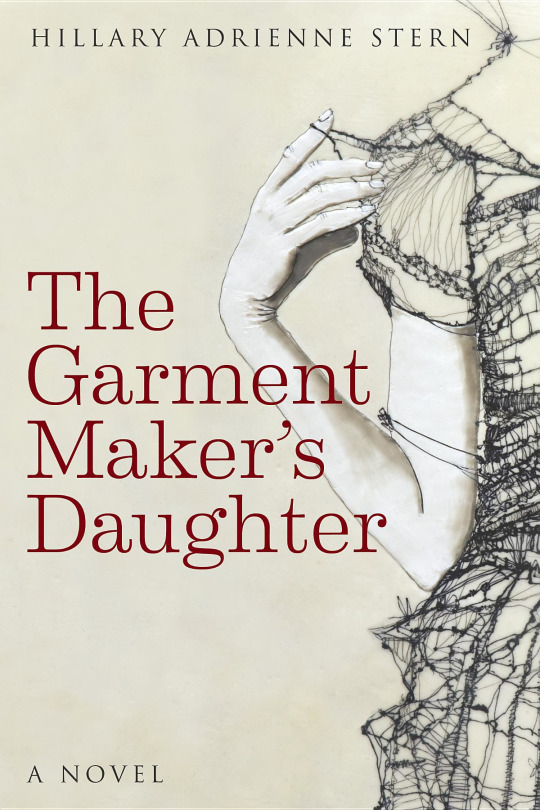
It would be too redundant and annoying to mention which books were free this year’s round? Sometimes I feel the need to share how I come across certain books, but often times I think it might be unnecessary. Either way, this yes, was a freebie. Again, didn’t read the summary, as usual. First-time author. Hopefully, I can organize my thoughts enough to write an informative review with less and less unnecessary paragraphs telling you absolutely nothing, such as this intro. I thank you once again for taking your time reading this review, and hopefully, we’ll see each other in the next book! Oh, and before I am gone to the review land, I turned red when I synced my kindle to have stuff in the cloud — my notes, all 25 of them disappeared. I had to calm myself down, but not before communicating my outrage on both Goodreads and Twitter (anyone else reading and making annotations on Kindle feels like it’s such an ordeal to type anything on that device’s keyboard?), but thankfully, the turn-off-and-on again worked wonders. I am good. Catch the summary below, which I am learning for the first time ever, and be ready for my words next.
The Garment Maker’s Daughter is a multigenerational saga of immigrant dreams and sweatshop realities, labor strikes and women’s rights. It is the story of Lena Rothman, a shirtwaist-maker and active suffragette whose plans get derailed when she falls in love with her best friend’s boyfriend; Jake Brenner, a passionate labor organizer determined to lead the shirtwaist-makers on a high-stakes strike; and Daniel Cowan, a brilliant and ambitious night-school student hobbled by a shameful past.
Fate draws them together. Emotions bind them to each other. But secrets will tear them apart. When a devastating blaze engulfs the shirtwaist factory, Lena must fight for her life. And in the chaos of the fire’s aftermath, mistakes will be made with consequences that continue into the next generation.
Spanning the first half of the twentieth century, this is a story about unforgettable characters and the threads of friendship, love, betrayal, and redemption that form the fabric of their lives. FAns of Adriana Trigiani, Kristin Hannah, and Christine Baker Kline, will love The Garment Maker’s Daughter. It's that rare novel you’ll be thinking about long after you’ve finished it. (less)
So, if you’re looking for a three POV (at one point it will turn to 4) set in the 20’s (not too historical as I often turn to) this book is for you. But I ought to inform you it will be painful before it gets any better. It started off with too much promise and maybe a bit foretelling, but I enjoyed it immensely. What threw me off in a U-turn was the mid-book events. Everyone was either too miserable or too much okay with their predicament… that it stalled for a good % of the book, but things began to warm up once again, and more plot twists came to light. And my mind was so fucking in love with everything. I was suspecting the couple to end up together, but this threesome (not in a sexual way - btw, it was so refreshing reading this, totally safe to all ages!) were terrible when it came to the matter of the heart. I felt like I was reading a Mexican soap opera, and it was irking me so much I had to put down for a 24 hour period so I could get motivated into continuing. Glad I did, but it irked me even more how it ended. Like, four people POV and the last one had a chapter with one page and the writing “the end” that I almost threw my kindle away… Oh my god, I am sorry, stop rambling old me… getting back to it. Imagine an immigrant arriving in NY city around 1918 (?), getting acquainted with someone who was on the ship as well… a friendship blossoming from that. Work coming their way, and with that: friendships, love at first sight, dangerous scenarios, a pregnancy, a marriage proposal, a runaway, a little girl, a new marriage, years and years later, some more drama, some tears, some truths and some lies, some losses, some risks and knowledge.
Maybe the book has shown them all, maybe not. Trying to create some mystery for those aware I can post screenshots as well as words. If you don’t plan on scrolling some more… it is okay, I am sure I have caught your interest enough to pick this book — and if you need some more spoiling or the whole plot, be aware of those known screenshots below (30 in total, I went overboard, sorry Author!).



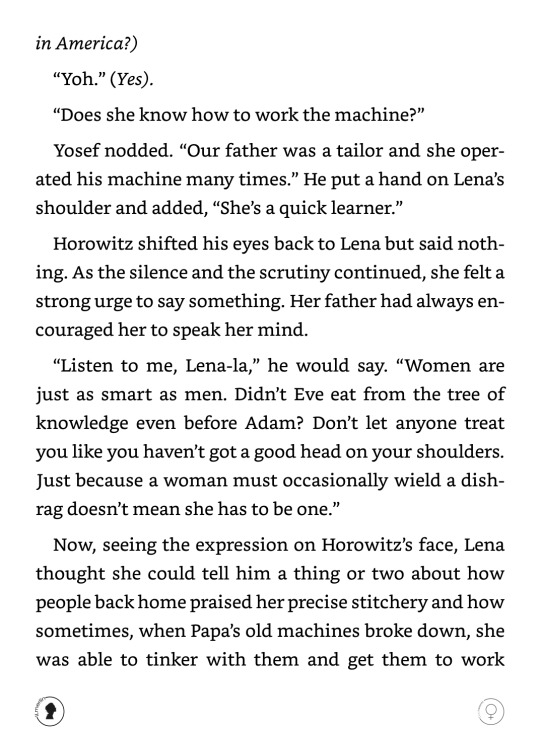
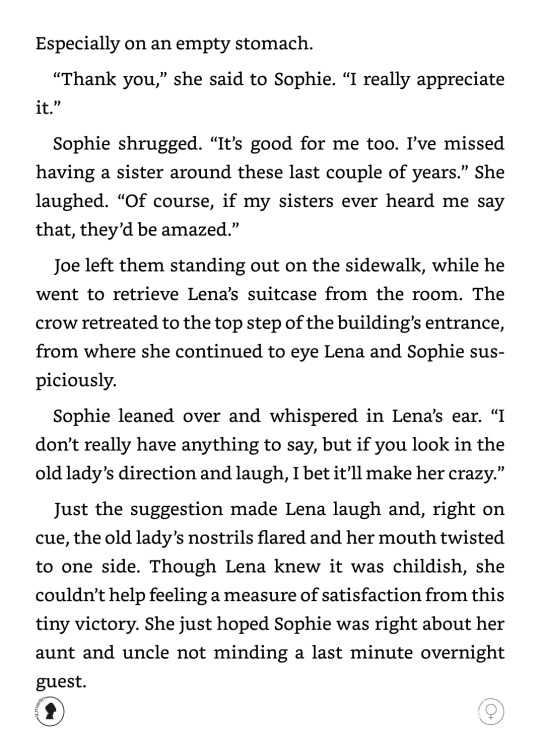
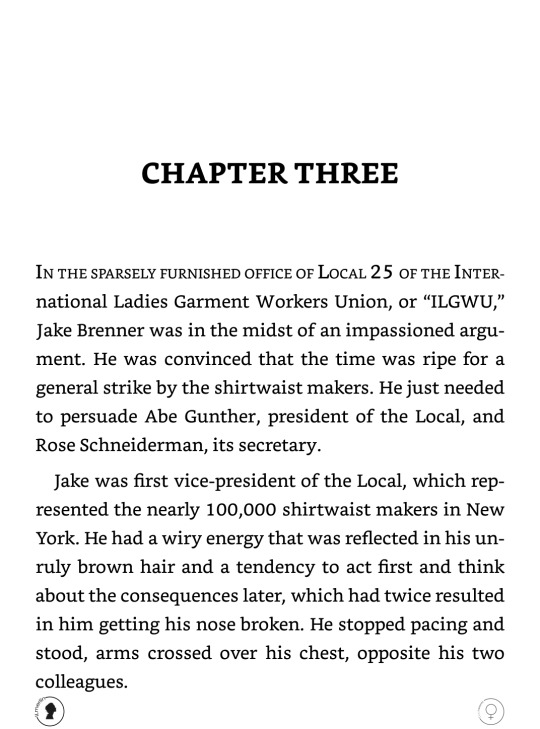
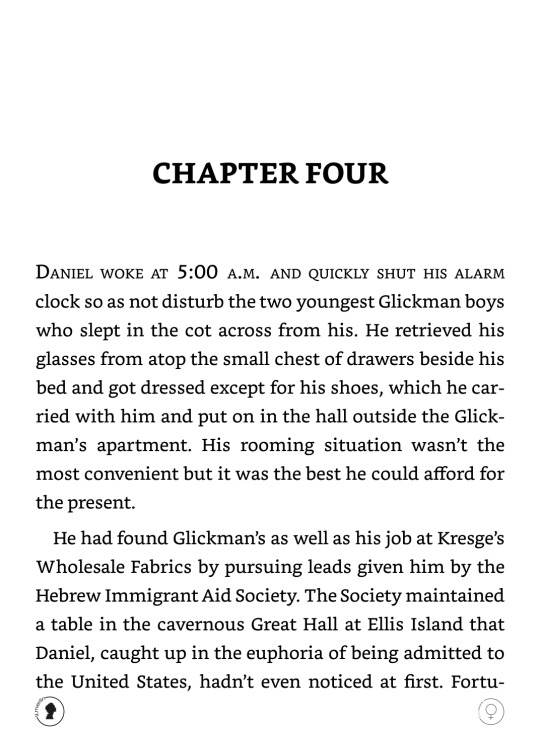

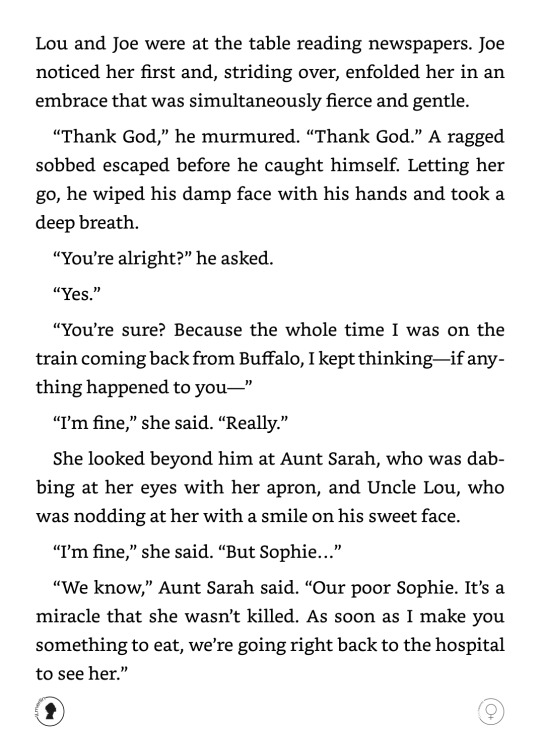
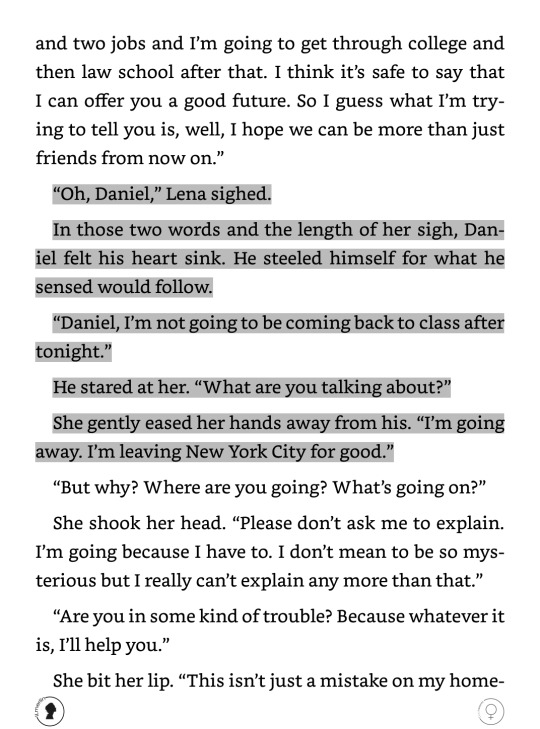

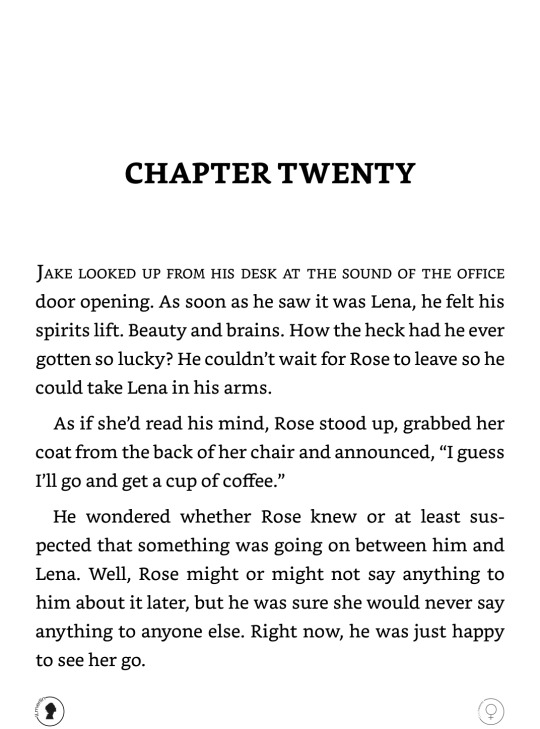
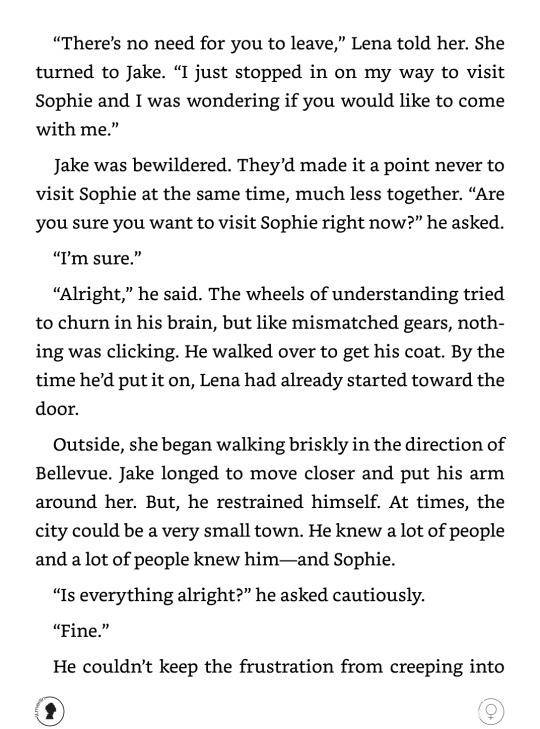







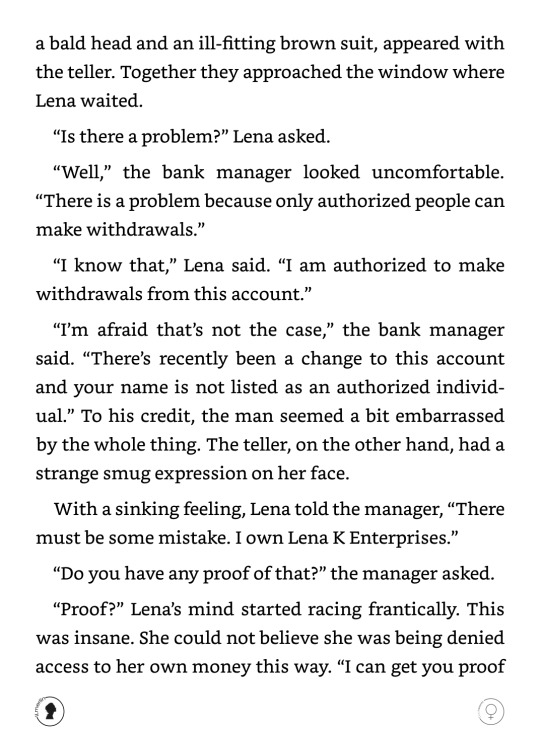
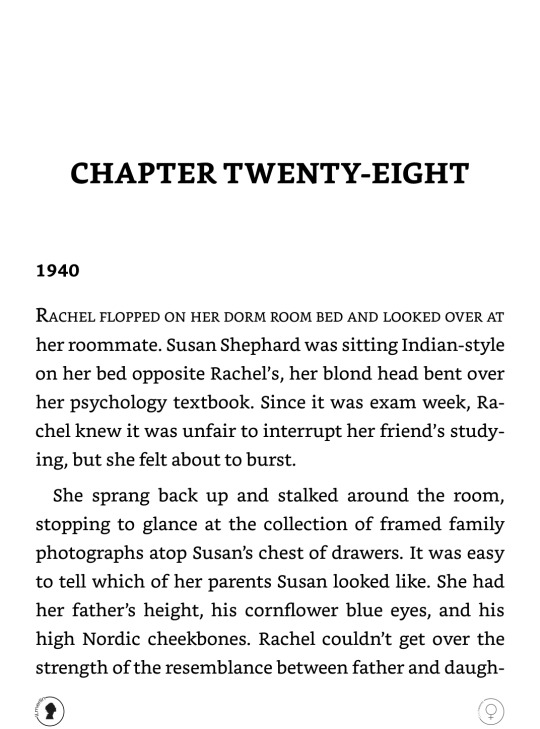

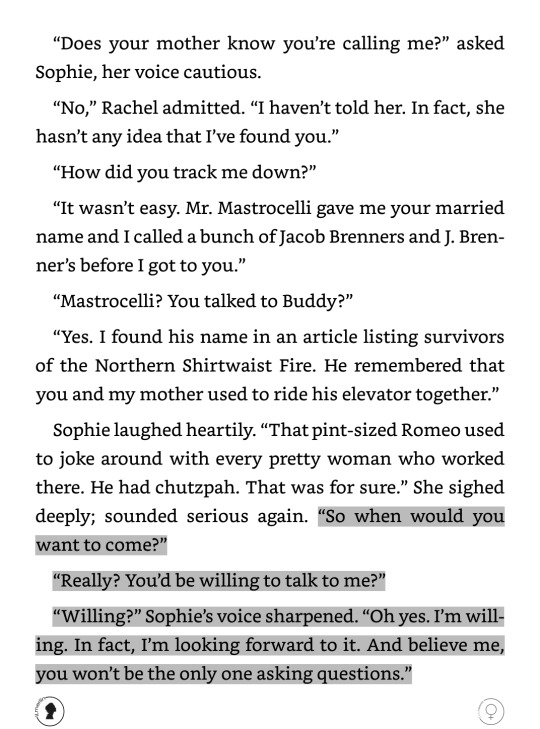


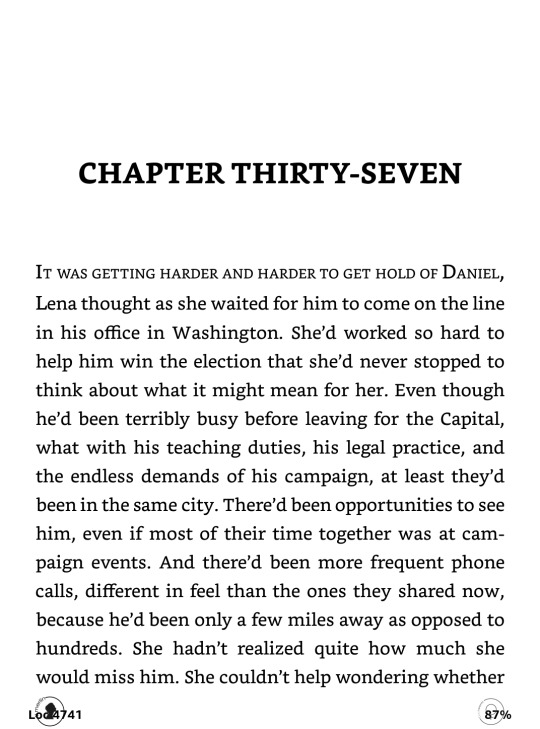


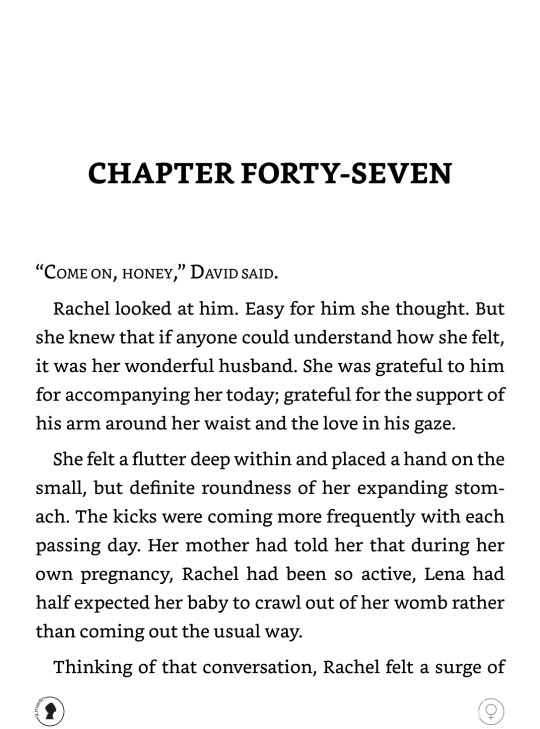
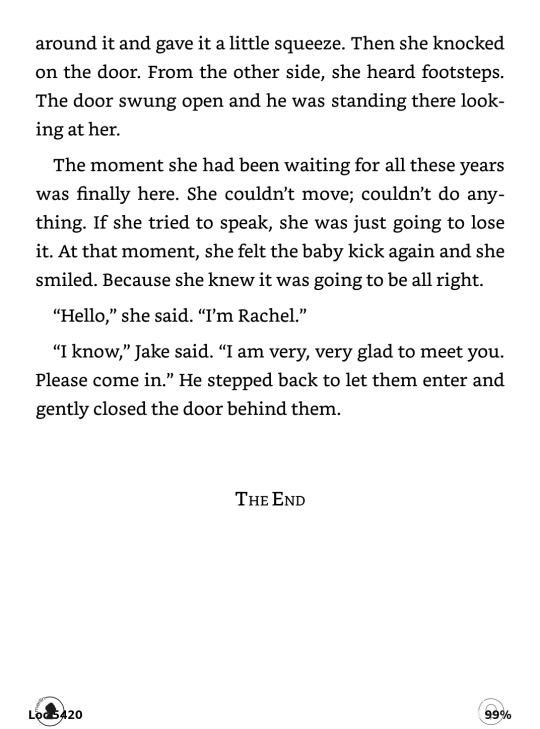
#Hillary Adrienne Stern#The Garment Maker's Daughter#Historical Fiction#Fiction#Historical#Romance#Book Review#Bookworm#Book#Review#femalebookworm
1 note
·
View note
Note
Okay, now that someone has asked about Neil and Wil, I gotta ask about how you think Wilbur and Franny are as mother and son? After all, Franny is most likely fairly famous and busy herself what with the singing frogs and all.
Oooo GOOD Q, FRIEND. Currently listening to jazz as I figure out how to answer it. (Edit: Kidding. I got tired of the jazz after a bit…)
Also note that apparently readmores do not work in asks. Oop. 😦👎 If need be, scroll down to the TLDR.
First of all I’d say that Wilbur is definitely a momma’s boy. Though he doesn’t have a preference for either parent over another, one can assume his relationship with Franny is very… straightforward. If only because we know even less about her than Cornelius. The benefit with Franny though is that we see her, as a mom, interact with Wilbur quite a bit.
The writers were clearly angling for a sentimental cool mom factor and in her introductory frog orchestra scene, she comes off as an idyllic mother: fun, weird, energetic, patient, and nonjudgemental. This is probably her good side that comes out especially around guests. The whole adopting Lewis thing has many possible explanations, one of which is that she just likes kids.
How she acts around Wilbur, esp as he gets older, is more casual. She’s often teasing him with punishments knowing his tendency to push the envelope. On a deeper level, this is her way of establishing boundaries but it’s ultimately one step above playful banter.
She’s vvvv openly affectionate towards Wilbur and to a degree Lewis (and presumably to most others as well). Re: Carpet Scene***, she teases Wilbur and jokes around w him and babies him and is never above play acting with him. That she doesn’t question Wilbur’s convoluted scheme to improve Lewis’ self-esteem is a real character-defining moment. Not a lot of moms would go for that. In fact the entire establishment that Wilbur and Franny regularly have conversations underneath a rug is a sign that Wilbur’s comfortable communicating w her, maybe not everything but I’d wager quite a few things. They do not however have the close, weird no-boundaries relationship that he has with his dad which is probably a good balance and allows him to have the kind of conversations he couldn’t have w someone who is also his best friend. (Boundaries. A slippery slope.) I don’t see a lot of genuine conflict between them, no weird expectations, no complex foil or double-life friendships hidden beneath the surface. Again: straightforward.
Lastly—the work thing. Ngl I think Fran and Neil are both workaholics.* Luckily, they live in a multigenerational home and have several inhuman servants AKA a bounty of free babysitters. Wilbur’s relationship with his parents can remain emotionally close and healthy even if he doesn’t see them 24/7 bc he has a safety net of an equally loving community of cowlicked family members. (And Carl.) Being his parents’ only child plus the whole family around him, Wilbur is never lonely or neglected.
But I do think Franny is ever so slightly less of a workaholic than Cornelius esp bc directing musical frogs isn’t as soul-crushingly demanding as running a tech corporation. Relatively speaking, it’s a solo career: sure you train the frogs, rehearse, compose, tour, promote, argue with your agent and accountant, etc but it’s nearly a one-man band compared to the bureaucratic chaos of Robinson industries. Also Franny and Cornelius’ personalities are complimentary, Franny embodies the Keep Moving Forward motto better than Cornelius does, considering most of what we’ve seen of him is getting obsessively frustrated over work.
And not to bring…… women’s rights….. into this Again but it’s likely Franny more often took time off work for Wilbur. (Which in my books might’ve become a point of contention w/i our little trio.) And to top it off, Franny clearly carves a bit of time for herself for hobbies i.e. karate, which as far as we know Cornelius does not do. As a result of this Wilbur’s probably less intimated by her success than he is w Cornelius.
That’s not to say I don’t think they’re equally work-savvy or equally willing to make sacrifices for Wilbur. I’d always envisioned Cornelius making a huge overhaul w his schedge/working from home more to make room for the ~joys~ of early childhood parenting but unfortch the result of said sacrifices are probably…. still less than Franny’s. Consequently, Wilbur is arguably closer to his mom for the simple fact that she’s there ever so slightly more than Cornelius. But it could also work otherwise: he’s closer to his dad bc in his absence, he gets to be the fun parent. (Or you know the one who grounds him less) Realistically though Fran and Neil probably lecture Wilbur equally but in dif ways
Where Wilbur kind of struggles to find things in common w Cornelius as he ages and presumably more or less hangs around him as he’s working or asks for homework help and maybe they have some TV show they watch together, Wilbur and Franny do share some common interests. Namely sports. Namely KARATE. Also play acting. Also, as I headcanon and think is heavily implied by the way Franny treats Lewis, playing backup to Franny’s rehearsals. (Also coughSINGINGcough)
The thing that peeves me is that where we don’t see Lewis/Cornelius’ relationships outside super individualistic lens, Franny is almost entirely defined by her relationships as a result of practicality n bc Lewis is the protagonist. Franny has… no obvious flaws or points for character growth. O Gods, if only we had the TIME!! (Sigh… thats what fanfic is for I guess.)
Anyways TL;DR: Franny is a fun mom and Wilbur’s a happy, spoilt momma’s boy. That scene in Twin Peaks season three with the mother racing her son across the street? Thats them.** Joyce and Will Byers? Also them. Mz. Frizzle and all her students? Also them!!!
*Workaholics: Most of the Robinsons probably are and this is sort of tied to the whole work hard, follow your dreams theme which has sort of become a Disney cliche. Notice how Robots (2005) and Cloudy w A Chance… are eerily close to MTR’s premise minus the humility of the adoption/family plot.
**Well… no spoilers but not entirely. I’m sorry I always reference things that Disney fandom-ers don’t watch… ¯\_(ツ)_/¯
*** for the uninitiated: THE CARPET SCENE: https://m.youtube.com/watch?v=7uPCWiqPCls&t=2m05s
#meet the robinsons#mtr#wilbur robinson#Disney#Franny & Wilbur#analysis#ask#super jazzed abt asks like these bc even though I think abt stuff like this in my head answering them forces me to analyse things more#thoroughly on the spot and who doesn't wanna analyse yr favourite futuristic family's dynamics????!!#:)
62 notes
·
View notes